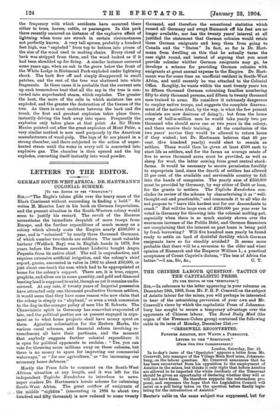LETTERS TO THE EDITOR.
GERMAN SOUTH-WEST AFRICA: DR. HARTMANN'S COLONIAL SCHEME.
[To THE EDITOR OF THE " SPECTATOR." I
SIR,—" The Eagle's talons glide over the heavy mass of the Black Continent without succeeding in finding a hold." So writes M. Maurice Lair in his book on German Imperialism, and the present situation in the South-Western colony would seem to justify his remark. The revolt of the Hereros necessitates the immediate despatch of more troops from Europe, and the further expenditure of much money on a colony which already costs the Empire nearly 2500,000 a year, and is " colonised " by nearly three thousand Germans, of which number two-thirds are soldiers. The most valuable harbour (Walfisch Bay) was in English hands in 1878, five years before the Bremen merchant Liideritz bought Ang,ra Pequefia from its native chief. The soil is unproductive, and requires extensive artificial irrigation, and the colony's chief export, guano, amounted in value in 1902 to about £50,000, or just about one-tenth the sum which had to be appropriated at home for the colony's support. There are, it is true, copper, graphite, and silver ore in some quantity, and gold and diamond bearing land is supposed to exist, though as yet it remains undis- covered. At any rate, if twenty years of Imperial possession have attracted only one thousand productive German settlers, it would seem that they have some reason who now claim that the colony is simply an "elephant," or even a weak concession to the dog-in-the-manger policy of men like M. Schurtz. The Chauvinistic spirit in Germany has somewhat evaporated of late, and the political parties are at present engaged in argu- ment as to what home projects shall have money spent on them. Agrarian colonisation for the Eastern Marks, the various canal schemes, and financial reform involving re- trenchment all have their partisans, and the moment that anybody suggests further colonial expenditure it is open for political opponents to exclaim : "Yes, you can vote for throwing more millions away on these colonies, but there is no money to spare for improving our commercial waterways," or "for our agriculture," or "for increasing our necessary home defences."
Mostly the Press fails to comment on the South-West African situation at any length, and it was left for the independent Tcigliche Rundschau to introduce to news- paper readers Dr. Hartmann's heroic scheme for colonising South-West Africa. The great outflow of emigrants of the middle " eighties " (amounting in 1884 to about two hundred and fifty thousand) is now reduced to some twenty thousand, and therefore the sensational statistics which roused all Germany and swept Bismarck off his feet are no longer available; nor has the twenty years' interval at all justified the statement that German colonies would retain these German emigrants and keep them from going to Canada and the "States." In fact, so far is Dr. Hart- mann from dwelling on this that he actually turns the case right round, and instead of arguing that you must provide colonies whither German emigrants may go, he develops a scheme for providing German colonies with emigrants at great annual expense to the Empire. Dr. Hart- mann was for some time an unofficial resident in South-West Africa, and until recently he was attached to the Colonial Office. Roughly, he wants within the next twenty years ten to fifteen thousand German colonising families numbering fifty to sixty thousand persons, and fifteen to twenty thousand men trained to arms. He considers it extremely dangerous to employ native troops, and suggests the complete disarma- ment of the natives (that, by the way, is what the few present colonists are now desirous of doing !); but from the home army of half-a-million men he would take yearly two per thousand who should serve one or two years in the colony, and there receive their training. At the conclusion of the two years' service they would be allowed to return home if they wished ; but Dr. Hartmann believes that 50 per cent. (five hundred yearly) would elect to remain as settlers. These would then be given at least 2500 each to start life as settlers, and for the farms an average estate of five to seven thousand acres must be provided, as well as sheep for wool, the latter coming from great central stock- farms. It would be necessary to secure permission forcibly to expropriate land, since the dearth of settlers has allowed 25 per cent. of the available and serviceable country to fall into the hands of companies. The yearly sum of £250,000 must be provided by Germany, by way either of Debt or loan, for the grants to settlers. The Tagliche .Rundschau con- cludes its review of the scheme by characterising it as "well- thought-out and practicable;' and commends it to all who do not propose to "leave this hardest nut for our descendants to crack." But will the large sum of £250,000 per year ever be voted in Germany for throwing into the colonial melting-pot, especially when there is so much anxiety shown over the enormous increase of the Public Debt, and German financiers are complaining that the interest on past loans is being paid by fresh borrowing ? Will five hundred men yearly be found ready to settle on laud of doubtful fertility which German emigrants have so far steadily avoided ? It seems more probable that there will be a reversion to the older and wiser opinion of Bismarck and the Emperor William I., a practical acceptance of Count Caprivi's dictum, "The less of Africa the










































 Previous page
Previous page